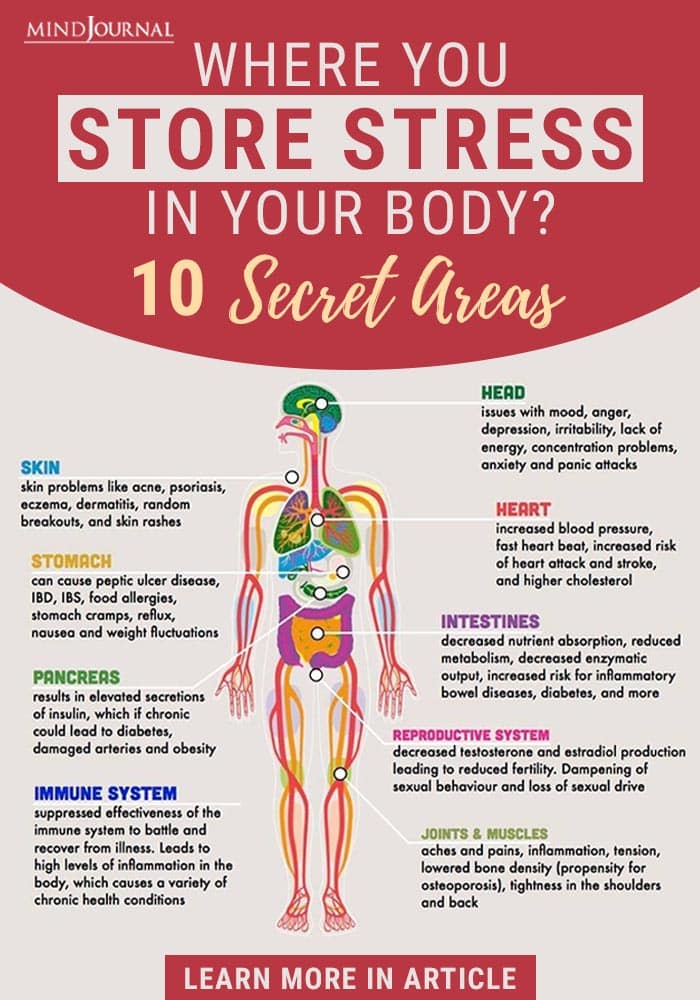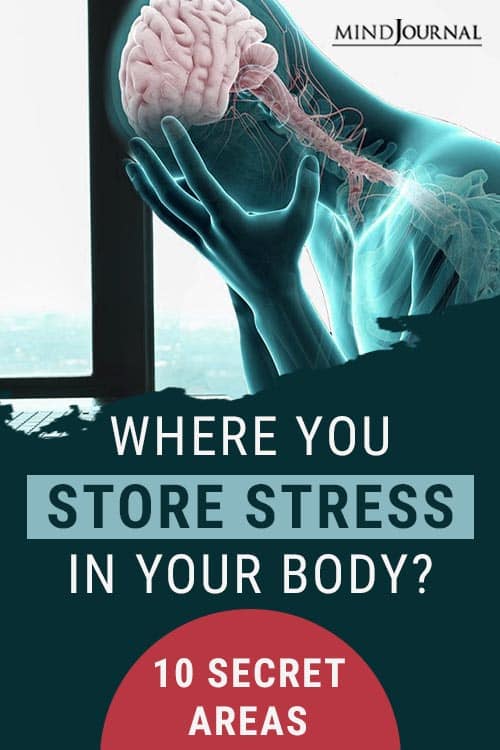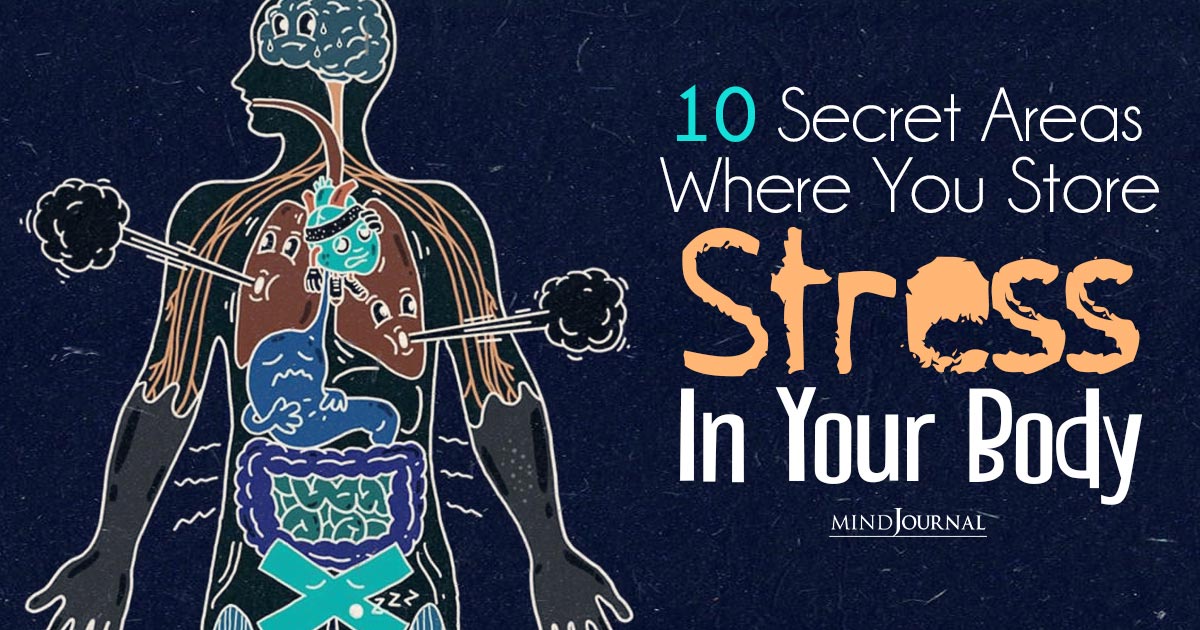Did you know that when you are disturbed, you tend to store stress in your body? But where do you store stress in your body? Interestingly and most of the time, you might not even realize that! This article is going to talk about all those secret areas where you store stress in your body.
Our language is filled with negative psychosomatic references to stress:
“My boss is a pain in the neck.”
“My co-worker gives me a headache.”
“My ex-boyfriend makes me sick to my stomach.”
Often we attempt to push unwanted feelings—such as irritation, fear, sadness—out of our awareness. We associate such feelings with hopelessness or powerlessness. So, in an effort to blot them, we forcefully engage in denial or repression.
We drive them out of our consciousness and deny our emotions. Instead of acknowledging, processing, and releasing these unwanted feelings, we bottle them up can convert them into stress.
Nathaniel Branden, the founder of The Psychology of Self-Esteem, insists that we must accept all our feelings without censorship; we should never disown, deny, or repress any part of our experience.
He points out that to deny our feelings is to keep ourselves in a perpetual state of internal conflict. The more you distance yourself from your feelings, the more disempowered, and out of touch with your true self.
But where do these unwanted feelings go?
Mysterious Aches and Pains
For years, I’ve made a study of where people tend to store their unwanted emotions. Certainly, not all body aches or illnesses are psychosomatic. However, as I studied people’s bodily reactions to stress, recurring patterns emerged.
Healthy vs. Unhealthy Repression
Fear is the driving force behind repression and is frequently rooted in your past. Repression is often necessary, particularly when you feel overwhelmed or experience trauma.
But overdependence on repression fuels psychosomatic symptoms and self-destructive patterns. As a therapist, I challenge my clients to come up with new responses to fear instead of repeating old behaviors.
I’ve made a list of these patterns below. You may recognize some of them. I personally can identify with all of them. Keep in mind, psychosomatic reactions are not neatly organized; some overlap, some converge.
It all depends on your character and interpersonal style. The list below is best used as a general introduction to psychosomatic symptoms, a jumping-off point for personal exploration.
As you review the list, ask yourself: Do any of these symptoms sound familiar?
10 Secret Areas Where You Store Stress In Your Body

1. Lower Back: Anger
If you sit on frustration, the lower back is commonplace for storing repressed anger. For relief, learn to constructively articulate frustration and address conflicts with others at the moment. Sounds simple? Believe me, it’s not.
Learning to harness the power of anger and turn it into a creative force is key to living a dynamic and rewarding life. Strive to convert anger into the assertion, express it constructively, not destructively. You’ll be rewarded with a surge in confidence, energy, and healthier relationships.
Related: Stress -How It Affects The Mind And Body.
2. Stomach & Intestines: Fear
When you’re afraid, you tend to tense your stomach and intestines. Sayings such things as “I’m sick to my stomach” is usually bodily responses to conflict. The more you deny or repress fears, the more physical reactions you’re likely to manifest.
Begin by acknowledging your trepidation and talking it through with someone you trust. Consider all your choices and outcomes. The more you can express the fear in words, the less of a hold it will have on your body.
3. Heart & Chest: Hurt
I recently worked with a woman who was complaining of chest pains. A series of medical work-ups found no psychical cause for her symptoms. Was she supposed to live with chronic discomfort?
Reluctantly she turned to therapy. When I asked her if someone she loved had hurt her, she guffawed and brushed my question off as psychobabble. A few sessions later, as she spoke about the demise of her last relationship, she began to cry uncontrollably.
For too long she ignored her broken heart. She needed to mourn the relationship and honor her sadness. After this release, the tension in her chest finally lifted.
4. Headache: Loss of control
If you’re a major or minor control freak, you’re in for a real challenge. No matter how strong-willed you might be, an emphasis on the control will eventually lead to burnout–and splitting headaches.
Not all difficulties in life can be solved by intellect or trying to control everything. In fact, many problems are exacerbated by controlling tendencies.
Letting go, accepting what you can and can’t control, and developing a mindfulness practice are the steps you need to take to cure your headache habit.
Related: Acupressure Points on Your Body That Can Help Relieve Stress & Anxiety
5. Neck/Shoulder Tension: Burdens And Responsibilities
Shouldering too many responsibilities is a pain in the neck. If you suffer from neck and shoulder tension, it’s likely that you’re overly burdened.
Rather than ask for help from others, you’re likely to do everything yourself. This most often leads to neck and shoulder tightness.
Learn to delegate, ask for support, decide what is really worth taking on, and for goodness sake, share responsibilities with others.
6. Fatigue: Resentments
Resentment stresses your entire body and does more damage to you than the people you resent. Blaming others, playing the victim, reliving the events–these are the empty calories of self-expression.
Resentments keep you from living in the moment and experiencing the benefits of being present. When you focus on those who wronged you, you are giving them free real estate in your head.
Instead, try to focus on forgiveness, or at the very least, moving on. Strive for more fulfilling relationships, add a healthy dose of self-care, and you’ll feel years younger in no time.
7. Numbness: Trauma
When we’re overwhelmed by an event, we tend to numb our feelings. This is our psyche’s way to disassociate from overpowering pain or danger. Traumatic events are not always life-threatening—they can result from a brush with real or imagined danger or a history of childhood abuse or neglect.
Over time, if you don’t process the trauma, the memory of it gets lodged in your body. As a result, you deaden your feelings when vulnerable; trusting others is impossible, and true intimacy is lost. Any situation that makes you feel unsafe causes you great confusion; you freeze up or go blank.
The first step toward freeing yourself from trauma is recognizing the power it has over you and asking for help.
Related: 7 Behaviors Common Among Adults Who Went Through Trauma At A Young Age
8. Breathing Difficulties: Anxiety
Breathing difficulties, a panic attack that leaves you gasping for air, a suffocating feeling when anxious. These are the symptoms I’ve noticed in folks who are repressing great sadness.
They don’t want to cry and avoid mourning heartbreaking events. Instead, they choose to repress sadness, move on, and focus on something else.
But restricting tears is a lot like holding your breath. When you finally cry, it comes gushing out; equal parts pain and relief. Freeing bottled-up sadness is like sucking in a dose of fresh oxygen. It’s refreshing and liberating!
9. Voice & Throat Problems: Oppression
Oppressed people are not allowed to have a voice. If you grew up in an oppressive atmosphere, speaking your mind or expressing your needs was dangerous. You also carry around a harsh inner critic.
As a result, as an adult, you tend to withhold feelings. When you have the impulse to speak up, you resort to your childhood tendency to silence yourself and repress your voice.
This clash between the impulse to speak and the impulse to withhold causes much tension and often manifests in throat and voice problems.
In therapy, I’ve found that journal writing is a great way to expose your inner critic and start talking back to it. Also reading poetry out loud (poetry has a profound connection to the unconscious) is a way of gaining confidence in your voice. Hopefully, you will soon realize you have the right to be heard.
10. Insomnia: Loss Of Self
When you go through life-changing events–good or bad–people tend to lose sleep. You experience anxiety when your life circumstances are in flux. This can happen during times of stress or times of great personal growth. For me, sleeplessness is most often associated with the fear of the unknown.
Write down your fears or, better yet, talk them out with a close friend. Learn to work with change, rather than repress your fear of it. When you work with it, you’ll be able to hit the pillow and have sweet dreams.
Toward a More Rewarding Way of Being
Releasing bottled up feelings is fundamental to psychotherapy; it offers you respite from the psychic stress of repression. People always feel relieved when the weight of repression lifts. Soon after, they report a surge of confidence, a product of a stronger emotional core. Group therapy is also an excellent tool for building stronger and healthier relationships.
Related: 5 Of The Best Stress Relief Exercises For A Calm Mind & Body
When you take better care of your feelings, you take better care of yourself and those you love. You come to appreciate and value your relationships more.
Take the time to consider how you manage your feelings and what your psychosomatic pain is trying to tell you. Not only will you feel happier and experience less stress, but many studies also show you might even live longer.
If you want to know more about where you store stress in your body, then check this video out below:
Written By Sean Grover
Originally Appeared In Sean Grover













Leave a Reply